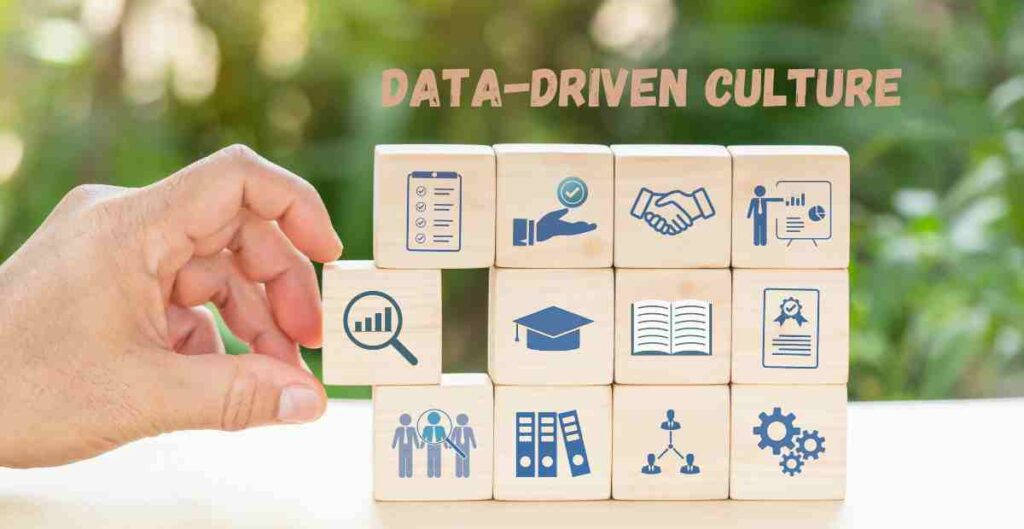In a world where data has become the new oil, businesses are rapidly transitioning towards a data-driven culture. Every decision, from marketing to development, is now backed by data, turning raw numbers into actionable insights. But what exactly is a data-driven culture, and how can businesses nurture this within their organizations? This blog post will delve into the heart of these questions and provide you with seven proven strategies to foster a data-driven culture in 2023. So, buckle up and get ready to dive into the fascinating world of data!
What is a Data-Driven Culture?

A data-driven culture is a working environment where decisions are informed by data rather than intuition or mere guesswork. It’s a culture that values and leverages data at every level, from the C-suite to the frontline employees. In a data-driven organization, data is not just a tool; it’s the lifeblood that fuels decision-making, innovation, and growth.
This culture isn’t about discarding human intuition but rather integrating it with data to make more informed decisions. Data-driven decision making is the process of making organizational decisions based on actual data rather than intuition or observation alone. But it’s not just about the decisions. It’s also about how these decisions are communicated, understood, and implemented across the organization.
How Businesses Benefit from a Data-Driven Culture

The benefits of adopting a data-driven approach are manifold. Let’s explore some of them:
- Informed Decision Making: Data provides factual evidence, which can be used to make well-informed decisions. It minimizes guesswork and provides a solid foundation for strategic planning and execution.
- Enhanced Customer Understanding: Data-driven insights can help organizations understand their customers’ needs, preferences, and behaviors more deeply. This leads to improved customer experiences and stronger customer relationships.
- Improved Operational Efficiency: By analyzing data, organizations can identify bottlenecks, inefficiencies, and areas of waste in their operations. This allows them to streamline processes, reduce costs, and improve overall efficiency.
- Increased Competitive Advantage: A data-driven organization can better understand market trends, competitor strategies, and industry dynamics. This enables them to anticipate changes, innovate effectively, and stay ahead of the competition.
In essence, a data-driven culture empowers organizations to be proactive rather than reactive, making them more resilient and adaptable in the face of change.
7 Ways to Create a Data-Driven Culture in 2023
Creating a data-driven culture isn’t an overnight process—it requires commitment, investment, and time. Here are seven strategies to help your organization foster a data-driven culture in 2023:
- Educate and Train Your Staff: First and foremost, it’s crucial to educate your team about the importance of data and how it can impact their daily tasks and the organization’s overall success. This involves training them to use data analytics tools and interpret data accurately.
- Establish Clear Goals and Metrics: Define what success looks like for your organization and how it can be measured using data. Encourage every department to set data-driven goals and track key performance indicators (KPIs) that align with the overall business objectives.
- Promote Open Data Access: To foster a data-driven culture, data must be accessible to all staff members—not just data scientists. Invest in user-friendly data platforms that allow employees to access and analyze data on their own.
- Integrate Data into Daily Processes: Incorporate data analysis into routine business processes. This could mean using data to plan marketing campaigns, make hiring decisions, or even schedule team meetings. The goal is to make data usage a habit, not an exception.
- Reward Data-Driven Decisions: Encourage your team to make data-driven decisions by recognizing and rewarding such behavior. This could be in the form of shout-outs in meetings, special awards, or even bonus points for those who consistently use data in their work.
- Invest in the Right Tools: There are numerous data analysis and visualization tools available today. Choose ones that best fit your organization’s needs and budget. Remember, the most expensive tool isn’t always the best—it’s about finding a solution that your team can comfortably use and understand.
- Ensure Data Quality: For a data-driven culture to thrive, you need to have reliable and high-quality data. Implement procedures to clean and validate your data regularly to ensure its accuracy and relevance.
Challenges and Opportunities in a Data-Driven Culture
While the benefits of a data-driven culture are clear, it’s not without its challenges. Organizations often grapple with issues such as data silos, data privacy and security concerns, and resistance to change.
However, these challenges also present opportunities. For instance, breaking down data silos can lead to better collaboration and innovation. Addressing data privacy concerns can build trust with customers, and overcoming resistance can lead to stronger buy-in and commitment to the data-driven approach.
The key is to view these challenges not as roadblocks but as stepping stones towards a more mature data-driven culture. After all, the journey to becoming a data-driven organization is a marathon, not a sprint.
Conclusion
Fostering a data-driven culture is an imperative in today’s business landscape. It allows businesses to make informed decisions, understand their customers better, improve operational efficiency, and stay competitive. While the path to creating this culture can be challenging, the benefits far outweigh the hurdles.
As we move into 2023, the question is not whether we can afford to become data-driven—it’s whether we can afford not to. So, are you ready to take the leap and foster a data-driven culture in your organization? Your data is waiting to tell you a story. Are you ready to listen?
Frequently Asked Questions
What is an example of a data-driven culture?
An example of a data-driven culture is a company where all decision-making processes are based on data analysis rather than intuition or experience. For instance, Netflix is a prime example of a data-driven culture. They use big data analytics extensively to understand user behavior and preferences. This data drives their content creation, personalized recommendations, and marketing strategies, leading to high customer engagement and retention.
What is the value of a data-driven culture?
The value of a data-driven culture lies in its ability to guide strategic decisions, streamline operations, and enhance customer experiences. It empowers businesses to make decisions based on facts and patterns rather than assumptions or guesswork. This can lead to improved business outcomes such as increased sales, improved customer satisfaction, and enhanced operational efficiency. A data-driven culture also promotes transparency and accountability, as decisions can be traced back to tangible data.
What is data-driven culture in an organisation?
A data-driven culture in an organization is one where data is at the heart of decision-making processes. In such a culture, data is widely accessible and regularly used by employees at all levels to make informed decisions. A data-driven organization values evidence over opinion, encourages curiosity, and is committed to continuous learning and improvement. Data-driven cultures also prioritize data quality and invest in the right tools and training to enable employees to leverage data effectively.
What are data-driven cultures that will stick?
Data-driven cultures that stick are those that are woven into the fabric of the organization. They are not just about having the right tools or processes but about fostering the right mindset. This involves promoting a culture of curiosity, encouraging employees to ask questions and seek answers in data. It also involves rewarding data-driven decision making and fostering a sense of ownership and responsibility towards data. Moreover, sustainable data-driven cultures are adaptable, continuously evolving with changing business needs and technological advancements.
How can you create a data-driven culture?
Creating a data-driven culture involves several key steps:
- Educate and Train Your Staff: Start by educating your team about the value of data and provide training on how to use and interpret it.
- Establish Clear Goals and Metrics: Define what success looks like in data terms for your organization. Set clear, data-driven goals and KPIs.
- Promote Open Data Access: Make data accessible to all employees, not just analysts or data scientists.
- Integrate Data into Daily Processes: Encourage employees to use data in their day-to-day work and decision-making processes.
- Reward Data-Driven Decisions: Recognize and reward employees who use data effectively to make decisions.
- Invest in the Right Tools: Provide your team with the right tools and resources to access, analyze, and interpret data effectively.
- Ensure Data Quality: Regularly clean and validate your data to ensure it is accurate, reliable, and relevant.

